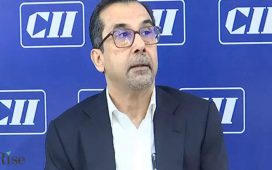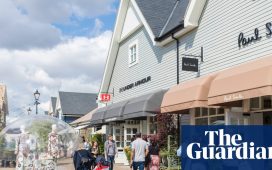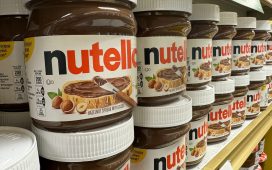In June 2020, while the UK was still in the grip of its first nationwide Covid-19 lockdown, Ocado raised just over £1bn from an issue of shares and convertible bonds on terms that reflected its status as an initial “pandemic winner”.
The company, which runs the eponymous online grocer in the UK but also supplies ecommerce technology to supermarkets around the world, seemed to have the world at its feet as internet shopping took off. But it now faces renewed questions about when its technology business will start generating serious profits.
Consumers have drifted back to shopping in stores and the hoped-for rush of new customers for its world-leading but expensive engineering has been slow to materialise. Some of its existing partners have been rethinking how they plan to deploy the online delivery capacity they have contracted to buy.
Its grocery operation struggled during the post-Covid surge in food price inflation, while the group has been embroiled in legal disputes with a Norwegian rival and even one of its co-founders, and is at loggerheads with its UK joint venture partner over a deferred payment.
“The equity story has been a car crash,” says Giles Thorne, an analyst at Jefferies who follows the stock. “When it goes high, people short it, when it goes low, people buy it like no one’s got conviction, they just know it’s going to move . . . That’s where we are.”

This week, Ocado refinanced some of the 2020 debt on terms that reflect both higher global interest rates and the changing mood music around the company. The price at which the new bonds can convert into equity is less than a quarter of the one set four years ago.
Tim Steiner, Ocado’s co-founder and chief executive, says he tries not to worry about the share price. “In the short term, [the market] is a voting machine, in the long term, it’s a weighing machine,” he tells the Financial Times in an interview conducted before the cash call, citing the legendary US investor Benjamin Graham.
“I could spend half my time trying to influence the voting machine and actually ultimately I won’t create the weight that we need in the long term in the weighing machine.”
For some, Ocado’s current funk is a result of the pandemic exposing the weaknesses as well as the strengths of its proposition. Clive Black, head of research at Shore Capital and a longtime sceptic, says the retail world has had plenty of time to assess the Ocado model “and it is concluding that it is not the right one for them”.

But for others, it epitomises the short-termism and risk aversion of UK markets that a company with thousands of patents and world-leading technology, and which reinvests continuously in research, development and innovation, is rated so lowly. Some wonder if it would fare better in private hands, or listed in the US.
William Woods, a European retail analyst at Bernstein, says equity markets are sometimes “a bit short term, and [Ocado] is investing for the future”.
“Is it right to be a public equity?” he asks. “I reckon if we were sitting here in 50 years’ time, we would still be talking about it.”
Among the UK’s suburban middle classes, Ocado is best known for its brightly coloured delivery vans and upmarket groceries.
Steiner founded the company in 2000 along with two of his colleagues at investment bank Goldman Sachs, neither of whom are now involved with the company.
Industry observers point out that when Amazon started out, it sold books — products that are small and easy to dispatch to shoppers. Fresh food, which is easily damaged, perishable and often requires refrigeration, is an altogether different prospect.
Thorne says what the company has achieved is “nothing short of miraculous and no one else has really done it. They have found a way to sell groceries online profitably . . . They have solved the biggest problems out there.”
The company floated in 2010. At that point, almost all its revenues came from its food delivery business. But because Ocado was an early mover in ecommerce, it had to build most of its technology from scratch and by around 2013, Steiner began to look at selling its services and knowhow to others.
As Thorne puts it, “you reach a point that says, ‘Well, look, I’ve spent all that money, I solved all of these problems. I’ve got something that no one else has got. How do I turn that into cash?’”
Progress was slow at first. Wm Morrison, one of the UK’s “big four” conventional supermarkets, signed up in 2013 but Steiner’s prediction that an international partner would be on board by the end of 2015 fell flat.
That all changed in 2017 when Ocado announced that French supermarket giant Groupe Casino would buy its technology, followed by Kroger, a US chain with $120bn of annual sales, a year later. The deals, especially the Kroger commitment to 20 automated warehouses — Ocado calls them customer fulfilment centres, or CFCs — vindicated Steiner’s optimism, routed the short sellers and catapulted the company into the FTSE 100.
More blue-chip customers followed. By the time the coronavirus pandemic struck in early 2020, Ocado looked to be on its way to becoming a large-cap British technology company well positioned to capitalise on the accelerating switch to ecommerce.
The pandemic was something of a mixed blessing for the company.
While its share price soared and the profitability of its own ecommerce business improved dramatically as customers maxed out their weekly shops, travel restrictions and supply chain problems made the rollout of capacity and the negotiation of new agreements in its technology business more challenging. Since signing up Japan’s Aeon in late 2019, South Korea is the only significant new market that Ocado has entered.
The sudden surge in demand also laid bare the limitations of the model based on centralised, highly automated facilities. Although Ocado’s robot-filled CFCs can pick a £100 order in minutes, they take years to build, fit out and commission and they are hard to expand quickly.
While conventional rivals such as Tesco and Asda rapidly ramped up online deliveries during the pandemic by throwing more staff into picking grocery orders inside stores, Ocado’s relatively fixed capacity meant its retail operation had to turn new customers away so it could continue fulfilling orders for its existing ones.


Once Covid eased, shoppers returned to stores with surprising enthusiasm. Supermarkets refined the way they picked and packed online orders from stores, looking to maximise the efficiency of pre-existing assets that are close to customers rather than making big new capital investments.
“Ultimately every store can become more profitable,” says Roy Horgan, a senior executive vice-president at Vusion Group, which is pushing technology that improves the efficiency of physical stores.
“If a store is doing 10 per cent of their baskets online and you can improve the efficiency of that basket . . . by moving the pickers, fewer substitutions, fewer [instances] of picking up the wrong products, there are untold amounts of upside,” he adds.
As the pace of online growth moderated, Ocado slowed the rollout of its own CFCs in 2022, and last month Sobeys, a buyer of its technology, said it would pause the construction of a facility near Vancouver. In the US, Kroger has also said it would close three smaller sites.
At a capital markets day two years ago, Ocado indicated it would have 300 so-called modules — a section of a fulfilment centre that can handle about £70mn of annual orders — by around 2027.
But by the end of last month, Ocado had 112 such modules operating and suggested it would reach at least 140 by 2026 with potential for more. “Maybe they were a bit naive in saying, ‘We’re going to get to 300 modules,’ and actually we’re now only going to get to 150, 160,” Woods says.
Steiner says he is “not averse” to in-store fulfilment, pointing out that more than 1,000 stores worldwide use Ocado software to power it. But he maintains that “if you have a city with sizeable population and you have a sizeable demand for ecommerce . . . you can make more money and you can grow a bigger business, because you can do a better job for the shopper if you have our automated warehouses”.
Thorne at Jefferies adds that Ocado’s financial results are also difficult to forecast. The share price trajectory “has been toxic because this commercial model is unique, there is no precedent, it’s very hard to model”.
The technology solutions business requires heavy upfront investment then generates income from usage agreements whose terms are confidential, a situation he describes as “three years of investment followed by this uncertain annuity [income]”.
James Lockyer, technology analyst at Peel Hunt, adds: “It’s a highly operationally geared, success-based model. The more you can get them to use it, the higher your revenues — and higher still your profits.”
But it is also the driver of Ocado’s appetite for capital. Since its foundation — and including the refinancing just announced — the company has raised more than £4.5bn from equity and debt investors, according to FT calculations.

The online food business, which since 2019 has been run as a joint venture with Marks and Spencer, has a very different financial profile with large turnover but low profit margins.
Overall, the company has only made a pre-tax profit in three of the 23 years since its foundation. Black, of Shore Capital, last month likened it to “a state-funded not-for-profit research house” that had not made “an economic return after nearly a quarter of a century”.
Steiner retorts that traditional supermarkets “want to tell you their ecommerce businesses are profitable when they’re not” and that for all the “wisecracks” about Ocado’s returns “if we just stayed as a UK retail business, we’d already have got into profitability”.
This month the company said it would be profitable on a pre-tax basis in about five years and would start generating cash, rather than consuming it, in the second half of 2026.
Woods is adamant there is still a need for “an Ocado business”.
“Very simply, the cost of labour is going up, the cost of tech is going down,” he says. “Automation is necessary and online will grow as a percentage [of the total grocery market].”
Kroger’s chief executive, Rodney McMullen — who has been fulsome in his praise for Ocado — said it was possible that online profit margins would eventually be better than those of bricks and mortar stores. This month he said he “remains optimistic” about Ocado and “the opportunities ahead”.
Lockyer at Peel Hunt believes that one of Ocado’s mistakes was to assume that the supermarkets it works with would be able to replicate Ocado by simply implementing the same technology.
“In business-to-business technology, where you sell a piece of software or provide access to tech, generally speaking, you don’t say, ‘There you go,’ and walk away. You generally say, ‘Here you go, now let me help you use it better.’”

Ocado has been rectifying this over recent months, instilling learning from its own online grocery business into its customers. “If we got into helping more early on, we might be further ahead than we are, absolutely true,” Steiner acknowledges.
Ocado’s post-pandemic fall from favour has raised questions about whether London is the best place for an increasingly technology-driven business to be listed.
Lockyer points out that “in the UK there is a greater weight placed on nearer-term income, such as dividends”. Investor attitudes in the US are different, he says. “It’s almost like: ‘more investment? Yes, please.’”
Steiner says he is content with the company’s decision to list in London in 2010 as it needed cash to expand although “there are lots of things you do in life that have pros and cons”. He told reporters this month that he was not working on shifting to a listing in the US amid speculation it could leave London for New York.
Opinion is similarly split among analysts as to whether Ocado should continue investing in its technology to grow and, as Lockyer puts it “get that big pie at the end” versus reining in spending to improve near-term profitability.
This month it raised profit forecasts for its key technology division, although that was partly because Sobeys’ decision to delay one of its warehouses reduced capital spending.
Woods has also questioned whether Ocado would be better off as a private company, owned by long-term investors. “You can say, ‘We’re going to make money in 10 years’ time,’ and that’s what people expect, but it’s challenging as a public equity”.
One major shareholder tells the FT they were “hugely impressed” by the management team and were very committed to the company.
With its debt maturities now pushed out until the end of the decade, Steiner can focus on generating positive cash flow in the second half of 2026, saying the only reason it would not achieve that “is because we’ve had a whole bunch of orders that no one was expecting us to have, worth a huge amount of money to us in the future”.
In the meantime, it is business as usual. “There are times when it feels fabulous and there are times when you think the markets are undervaluing what you are doing,” he says.
“It’s always really important that you don’t sit and watch [the share price] and [tell] everybody how unfair it is — I try to get everyone else [at Ocado] to treat it as noise.”










